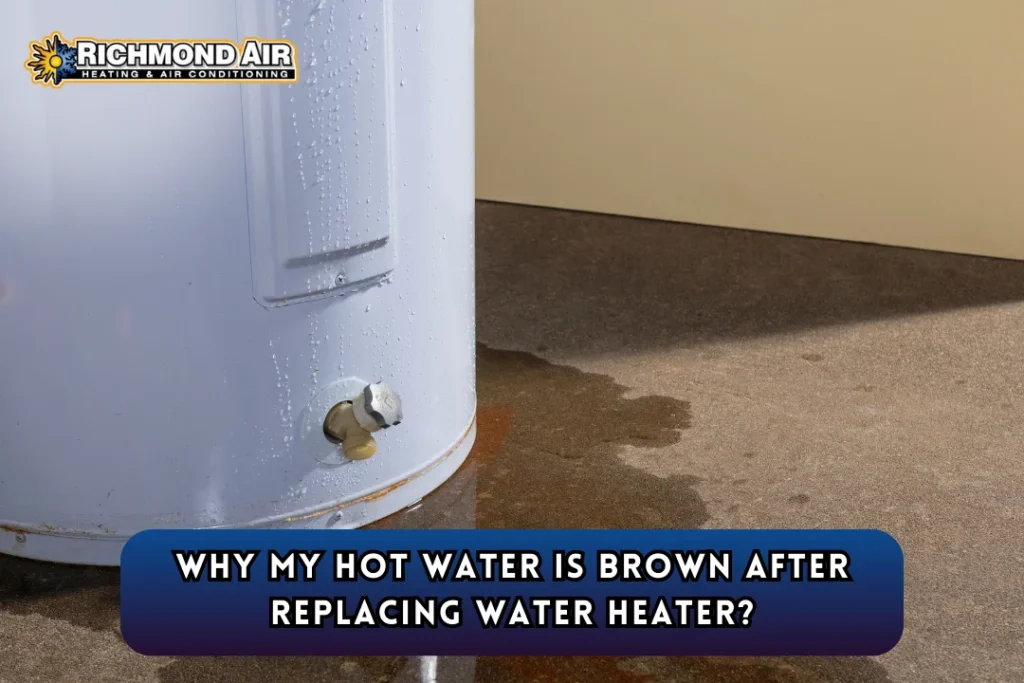Replacing a water heater is supposed to solve problems, not create new ones. So, when you turn on the tap and see brown water flowing out after installing a brand-new water heater, it’s natural to feel frustrated (and maybe a little grossed out). But don’t worry, you’re not alone in this. Many homeowners face this issue, and the good news is that it’s usually fixable. Let’s get into why this happens, what it means, and how you can get your water running clear again.
Why My Hot Water Is Brown After Replacing Water Heater?
If you’ve just replaced your water heater and are now dealing with brown water, there are a few common culprits behind this rusty surprise. Here’s a breakdown of the most likely reasons:
1. Sediment Disturbance
When a new water heater is installed, the process can stir up sediment and rust that has been sitting in your plumbing system for years. This is especially common in older homes with aging pipes. The installation process involves turning the water supply on and off, which can dislodge these particles and send them straight to your faucet.
2. Rusty Pipes
If your home has galvanized steel pipes, they could be the source of the brown water. Over time, these pipes corrode, and the rust can mix with your water. Replacing the water heater might have simply exposed an existing issue with your plumbing.
3. New Water Heater Components
Sometimes, the inside of a new water heater can contribute to discoloration. For example, the anode rod, which is designed to prevent tank corrosion, can release small amounts of rust or minerals into the water, especially during the first few uses.
4. Water Supply Issues
It’s also possible that the problem isn’t inside your home at all. Municipal water systems can experience disruptions or maintenance that temporarily cause brown water. If this is the case, your neighbors might be seeing the same issue.
Is Brown Water Dangerous?
The sight of brown water is definitely unpleasant, but in most cases, it’s not harmful. The discoloration is usually caused by iron or manganese, which are naturally occurring minerals found in water supplies. While these minerals aren’t toxic, they can make your water taste metallic, stain your laundry, discolor your fixtures, and even leave unsightly marks on your sinks or tubs.
However, if the water has a foul odor, appears unusually cloudy, or you suspect contamination from other sources, it’s essential to have it tested. Testing ensures there are no harmful bacteria, chemicals, or other pollutants that could pose health risks to you or your family.
How to Fix Brown Water After Replacing a Water Heater

Now that you know what might be causing the problem, let’s talk about solutions. Here are some practical steps you can take to clear up your water:
1. Flush Your Water Heater
One of the first things you should do is flush your new water heater. Sediment can build up in the tank during manufacturing or installation, and flushing it out can help. Here’s how:
- Turn off the water heater and let it cool.
- Connect a garden hose to the drain valve at the bottom of the tank.
- Open the valve and let the water run until it’s clear.
- Close the valve, disconnect the hose, and turn the water heater back on. 2. Run Your Faucets
If the brown water is caused by sediment in your pipes, running your faucets for a few minutes can help flush it out. Start with the faucet closest to the water heater and work your way to the farthest one.
Check the Anode Rod
The anode rod in your water heater is designed to attract corrosive elements and protect the tank. However, if it’s releasing too much rust, you might need to replace it. Consult your water heater’s manual or call a professional plumber for assistance.
Inspect Your Pipes
If flushing the water heater and running your faucets doesn’t solve the problem, the issue might be with your plumbing. Corroded pipes can release rust into your water, and replacing them might be necessary. This is a job best left to a licensed plumber.
Contact Your Water Supplier
If you suspect the problem is with your municipal water supply, reach out to your local water authority. They can provide information about any ongoing maintenance or disruptions that might be affecting your water quality.
My Personal Experience with Brown Water Woes
Let me tell you, I’ve been there, and I completely understand how frustrating and unsettling it can be. A few years ago, I replaced my old water heater, excited for the promise of long, hot showers without any issues. But instead, I was met with murky, brown water that made me question every decision I’d made that week.
I felt overwhelmed and worried about what might be wrong. After a brief moment of panic (and a lot of late-night Googling), I discovered that the issue was sediment stirred up in my pipes during the installation process.
With a bit of guidance, I flushed the water heater, ran the faucets to clear the lines, and, thankfully, the water returned to normal. It wasn’t the smooth experience I’d hoped for, but it was a fixable problem—and yours will be too. Trust me, with a little patience and the right steps, you’ll have clear, clean water again in no time.
Why Does Rust Make Water Brown?
Rust is essentially iron oxide, which forms when iron reacts with oxygen and water. When rust particles mix with water, they give it that characteristic brown or reddish tint. While it’s not harmful in small amounts, it’s definitely not something you want to see in your drinking water.
Final Thoughts
Dealing with brown water after replacing a water heater can be frustrating, but it’s usually a temporary issue with a straightforward solution. Whether it’s sediment in your pipes, rusty components, or a municipal water problem, taking the right steps can help you get your water running clear again. Remember, if the problem persists or you’re unsure about the cause, don’t hesitate to call a professional plumber for help.
If you are still struggling with brown water after replacing your water heater, don’t let the problem linger, Contact us today to diagnose and fix the issue. Clear, clean water is just a phone call away.
FAQs
water to clear up?
It usually clears up within a few hours to a day after flushing the water heater and running your faucets. If the problem persists, you may need to investigate further.
Can I use brown water for bathing or washing?
While it’s generally safe, brown water can stain your clothes and leave a metallic smell on your skin. It’s best to wait until the water runs clear.
Do I need to replace my pipes if they’re rusty?
Not always. If the rust is minimal, flushing the system might be enough. However, severely corroded pipes may need to be replaced to prevent future issues.
Why does my water smell bad along with being brown?
A bad smell could indicate bacterial growth or contamination. In this case, it’s important to have your water tested and consult a professional.
Can a water softener help with brown water?
A water softener can reduce mineral buildup in your water, but it won’t fix issues caused by rust or sediment in your pipes or water heater.


